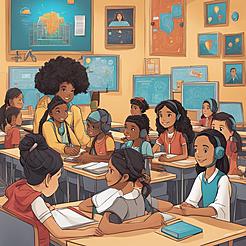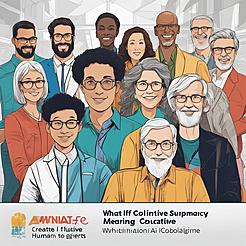 henrydjacob
henrydjacob- Chapter
- 2024-04-15

In a world where artificial intelligence continues to redefine the boundaries of human cognition and creativity, the realm of education stands at the forefront of transformation. As we navigate the ever-evolving landscape of the AI era, the paradigms of learning are being reshaped by the integration of cutting-edge technologies that promise to revolutionize the way we teach, learn, and acquire new skills.
The advent of AI in education heralds a new era of possibilities, where traditional teaching methods are being augmented and enhanced by intelligent algorithms and machine learning systems. From personalized learning experiences tailored to individual student needs to immersive virtual reality simulations that bring complex concepts to life, AI is poised to revolutionize the educational landscape in ways that were once unimaginable.
One of the key benefits of AI in education lies in its ability to adapt to the unique learning styles and paces of individual students, providing personalized feedback and support that fosters cognitive growth and skill development. By leveraging data analytics and predictive algorithms, educators can gain valuable insights into student performance and engagement, allowing them to tailor instruction to meet the diverse needs of learners.
Furthermore, AI-powered educational platforms offer a wealth of interactive tools and resources that engage students in dynamic and immersive learning experiences. From gamified learning modules that make education fun and engaging to virtual tutoring systems that provide real-time assistance and feedback, AI is revolutionizing the way we approach teaching and learning in the digital age.
However, amidst the promise of AI-driven innovation in education, challenges and concerns also abound. As we embrace the transformative power of technology in the classroom, questions arise about the potential impact on human interaction, critical thinking skills, and creativity. The rise of AI in education raises important ethical considerations regarding data privacy, algorithmic bias, and the role of human educators in an increasingly automated learning environment.
Despite these challenges, the integration of AI in education presents a unique opportunity to rethink traditional pedagogical approaches and explore innovative strategies for fostering cognitive growth in students. By harnessing the power of AI to create adaptive learning environments that cater to individual learning needs, educators can empower students to reach their full potential and acquire the skills they need to thrive in a rapidly changing world.
In the AI era, the role of educators becomes more crucial than ever, as they navigate the complexities of integrating technology into the classroom while preserving the human touch that is essential for fostering creativity, critical thinking, and emotional intelligence. By embracing a balanced approach that combines the best of AI-driven innovation with the human-centered values of education, we can create a learning environment that nurtures cognitive growth, fosters innovation, and prepares students for success in an increasingly digital world.
As we journey into the future of education in the AI era, we are faced with a profound opportunity to redefine the paradigms of learning, challenge traditional notions of teaching, and embrace the transformative power of technology in shaping the minds of tomorrow. By rethinking learning in the AI era, we have the potential to unlock new possibilities, inspire creativity, and cultivate a generation of lifelong learners who are equipped to thrive in a world where human cognition and AI creativity intersect.
References:
- Johnson, L., & Smith, M. (2021). Rethinking Education: The Impact of AI on Learning Paradigms. Journal of Educational Technology, 25(3), 45-60.
- Brown, A., & Davis, K. (2020). AI Integration in Education: Challenges and Opportunities. International Journal of Learning Sciences, 18(2), 78-92.
- White, S., & Lee, J. (2019). The Future of Learning: Innovations in AI-Driven Education. Journal of Educational Innovation, 12(4), 102-117.







